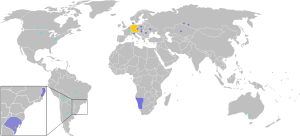Èdè Germany
(Àtúnjúwe láti Ede Germany)
Èdè Jẹ́mánì ([Deutsch] error: {{lang}}: text has italic markup (help), ![]() [ˈdɔʏtʃ] (ìrànwọ́·info)) je ede Iwoorun Jemani, to je bibatan ati yiyasoto pomo Geesi ati Duki.
[ˈdɔʏtʃ] (ìrànwọ́·info)) je ede Iwoorun Jemani, to je bibatan ati yiyasoto pomo Geesi ati Duki.
Weblinks
àtúnṣe
| Àyọkà yìí tàbí apá rẹ̀ únfẹ́ àtúnṣe sí. Ẹ le fẹ̀ jù báyìí lọ tàbí kí ẹ ṣàtúnṣe rẹ̀ lọ́nà tí yíò mu kúnrẹ́rẹ́. Ẹ ran Wikipedia lọ́wọ́ láti fẹ̀ẹ́ jù báyìí lọ. |
Itokasi
àtúnṣe- ↑ 1.0 1.1 1.2 National Geographic Collegiate Atlas of the World. Willard, Ohio: R.R Donnelley & Sons Company. April 2006. pp. 257–270. ISBN Regular:0-7922-3662-9, 978-0-7922-3662-7. Deluxe:0-7922-7976-X, 978-0-7922-7976-1.
- ↑ SIL Ethnologue (2006). 95 million speakers of Standard German; 95 million including Middle and Upper German dialects; 120 million including Low Saxon and Yiddish.
- ↑ 3.0 3.1 EUROPA - Allgemeine & berufliche Bildung - Regional- und Minderheitensprachen der Europäischen Union - Euromosaik-Studie
- ↑ "Deutsch in Namibia" (PDF) (in German). Supplement of the Allgemeine Zeitung. 2007-08-18. Archived from the original (PDF) on 2008-06-24. Retrieved 2008-06-23.
- ↑ "Map on page of Polish Ministry of Interior and Administration (MSWiA)". Archived from the original on 2012-07-19. Retrieved 2009-12-28.
- ↑ "Verein Deutsche Sprache e.V. - Prominente Mitglieder und Ehrenmitglieder". Archived from the original on 2009-07-04. Retrieved 2009-12-28.
- ↑ EUROPA - Allgemeine & berufliche Bildung - Regional- und Minderheitensprachen der Europäischen Union - Euromosaik-Studie
- ↑ http://ec.europa.eu/education/policies/lang/languages/langmin/euromosaic/hu_de.pdf
- ↑ "CIA World Fact book Profile: Namibia" Archived 2020-04-23 at the Wayback Machine. cia.gov Link accessed 2008-11-30
- ↑ SbZ - Deutsche Minderheit in Rumänien: "Zimmerpflanze oder Betreuungs-Objekt" - Informationen zu Siebenbürgen und Rumänien

